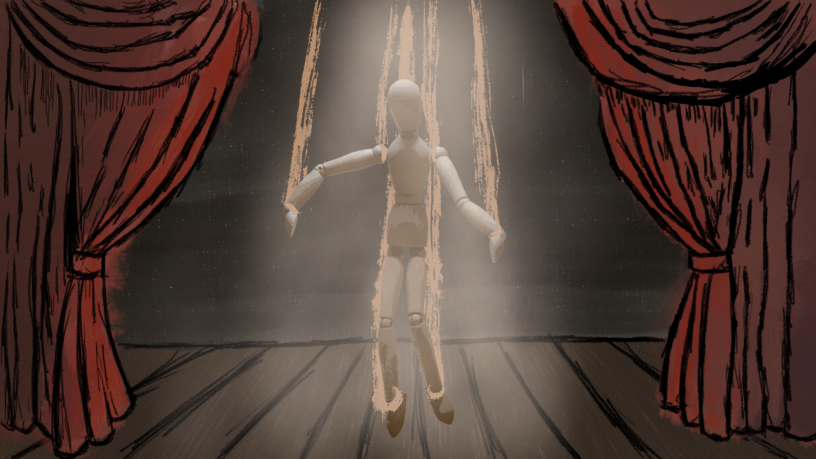Words by Nicole Soroka
Visuals by Jerry Zhang
Surrounded by the solid brick walls and tall windows of the recreational activities room in her local church, Jane Carty and her younger sister took part in a half-acrobatics, half-acting class. The church itself was a quiet space when it wasn’t holding a service, but the laughter that emanated from the eager young artists brought the building to life every week. Throughout the year, students would unite to perfect their production of The Addams Family, rehearsing their lines and sharpening their skills together.
Carty’s love for acting began at a very young age. The first-year media production student at Toronto Metropolitan University (TMU) remembers auditioning for the play, filled with nerves. It was her first time doing anything of the sort. On her audition day, Carty learned two things: she would connect with the kids who surrounded her in class and would later grow to become her lifelong friends.
She also learned a valuable lesson from her mom, who gave her sound advice for her newfound love of acting.
“If you’re nervous about something,
it simply means you care”
Fast forwarding to 2023, Carty is still pursuing her love for acting while branching out into the world of media. After a year of pursuing a journalism degree at TMU, Carty found that she was better suited for a program where she could feel more creative freedom—like media production—and made the switch.
The film and television industries are an undeniable force in our society. Every day, individuals across the country frequently stream their favourite comfort movies or speed through the latest Netflix series that everyone seems to be talking about. The magic of media is what entices creatives like Carty to join the field and spread the same kind of joy that many others thrive on.
However, with the historic Hollywood strikes that have been circling the media and disrupting production for the past few months, Carty is “alarmed” at the amount of workplace mistreatment within the industry.
Whether it be the lack of respect towards writers with the rise of artificial intelligence (AI) produced scripts or the absence of compensation for self-tape auditions, the media industry is suffering. Thus, many students who are hoping to break into the field are concerned about what their futures will entail. With a tumultuous present and an uncertain future as to which problems will present themselves next, what do emerging entertainment industry workers have to look forward to?
On May 2, the Writers Guild of America (WGA) went on strike after they were unable to reach an agreement with the Alliance of Motion Picture and Television Producers (AMPTP). The main goals of this strike were to increase the amount of jobs—as well as wages—for writers. Additionally, the union was looking to decrease AI use within their workplace. The WGA received an outpouring amount of support from the Screen Actors Guild-American Federation of Television and Radio Artists (SAG-AFTRA) throughout their strike while the union was actively trying to address their own concerns with the AMPTP. On Sept. 24, the WGA reached a tentative agreement, with the new contract officially voted in on Oct. 9.
In September, Vanity Fair reported exactly what is outlined and included within the updated WGA. More details are expected to follow. Here are the biggest takeaways from the report:
- Streaming platforms will provide writers with viewership numbers for their projects and additional compensation if 20 per cent of the platform’s national subscribers watch a show or film within its first 90 days of streaming.
- AI cannot fully complete or edit a production script. A writer can use AI on a limited basis if they choose to but they can never be forced to use AI as an aid.
- The amount of employees in a writers room will increase in relation to the number of episodes that are included within a television show’s season. For example, a 10-episode season will include five writers.
The WGA strike is the second-longest strike in the union’s history at 148 days, with the longest strike having taken place in 1988 for 153 days.
SAG-AFTRA was also forced into a strike on July 14 as a result of their inability to come to an agreement with the AMPTP. Their biggest focuses were controlling the abuse of power that large streaming services possess, monitoring rules around self-tape auditions, raising minimum wages and limiting the use of AI on set. After a long negotiation process, the union came to a tentative agreement on Nov. 8, marking the end of the 118 day-long strike. The strike officially came to a halt on Nov. 9, with the union’s new deal with the AMPTP coming in at over one billion dollars.

SAG-AFTRA’s new deal includes a seven per cent increase in most minimum wages, protection for actors against AI and a historically new “streaming participation bonus.” The union says the finalized agreement details will be released once the deal is approved by the SAG-AFTRA National Board.
In a statement from Variety, SAG-AFTRA chair member Ben Whitehair says, “when performers understand what was gained, they’re going to be thrilled.” However, Whitehair also notes that their new deal didn’t cover every aspect of what the union was fighting for and SAG-AFTRA will return to the negotiation table in 2026.
With the recent SAG-AFTRA and WGA strikes, students in TMU’s media production and performance acting programs are feeling the impacts of the unjust treatment within the industry on a larger scale than ever. Both strikes directly impact media production within the United States but Canadian media and employment opportunities have also been significantly affected.
This past May, The Hollywood Reporter disclosed that 171 international films—a large bulk of them being from Hollywood—were shot in Canada throughout 2022. As the COVID-19 pandemic slowly wound down, Canadian film production numbers shot up 20 per cent from 2021, the article states. According to The Hollywood Reporter, Canada is also seeing a rise in Hollywood projects due to quick turnarounds and large volumes of new movies and shows on streaming platforms like Netflix and Disney Plus. With movies pumping out faster than audiences can keep track of—paired with the low Canadian dollar—it’s no wonder that the country is referred to as the “Hollywood North.”
John Lewis, the international vice president of the International Alliance of Theatrical Stage Employees, told The Globe and Mail in July that the WGA strike largely slowed down and even halted countless Canadian-based productions across the country. He added that there are many concerns within the unions—including abuse of power from large streaming services, a lack of writers being staffed on projects and an overuse of AI.
These historic Hollywood strikes pose an important question—what do these shutdowns and concerns mean for the future of workplace rights within the entertainment industry?
TMU media production and performance students are worried that their labour rights will not be respected if they continue to pursue a job in the industry. With handfuls of eager and driven students, the current treatment of professionals is leaving them questioning whether their careers will truly pan out to be the dream they’ve worked so tirelessly for.
As the bright light from a ring-shaped camera accessory fills his room, second-year performance acting student Arjun Kalra rehearses the lines for his latest audition. With his scene partner arriving in 10 minutes, he only has a few run-throughs left before they begin the self-taping process. His camera is perched upon his jet-black tripod and set to face the smooth, picturesque white backdrop. All of this preparation rests on the hope that Kalra will advance to the next round of auditions.
Kalra spends many days throughout the year recording self-tape auditions. These recordings are a production within themselves—setting up proper lighting, suitable backdrops, a microphone and a good quality camera to fully capture the magic.
Before that can even happen, Kalra spends up to a week prepping for the tape. Since he’s surrounded by like-minded students in his program, it’s easier for him to find a scene partner to help him read and rehearse—a luxury that many actors don’t have. Because of this, many people pay directly out-of-pocket for a reader that they can connect with for their particular scenes just to be able to record an unpaid tape for a gig they might not even get.
Kalra says it’s “sad” that students are taught that this is “the reality” of the media industry. The lack of compensation during the audition process and beyond is one of the many ways in which some students and emerging actors are left feeling mistreated.

James Nadler, the interim chair for TMU’s Radio and Television Arts School of Media, says there’s never been compensation for the actors attending the first round of auditions. Paid opportunities arise sometimes during and after callbacks.
According to Nadler, self-tapes are “to the advantage” of many actors because they allow you to audition for jobs across the globe without leaving the comfort of your own home.
“So, actors who are looking for money for self-taping—it’s not going to happen”
On top of this, Kalra fears that actors’ ability to grow their skill sets may be hindered by AI-generated scripts. With the personal and originality aspects taken out of the writing, actors may struggle to connect with scripts that lack authenticity.
Rebecca Wanzo, a gender and sexuality professor at Washington University, told Film Quarterly in September, that AI depiction on screen raises questions related to the calibre of work and overall definition of what it means to be human.
This past year, audiences saw multiple AI-focused movies on screen, including The Creator (2023) and M3GAN (2023). Wanzo says these types of films showcase “the pleasure and danger embedded in imagining the future of labor.”
Films utilizing AI technology to assist in production cause movie-goers and the media industry alike to evaluate how human-made media can’t be replaced.
While the SAG-AFTRA and WGA strikes have not swayed Kalra away from working towards a career in the acting industry, he remains aware of the continued fight for workplace rights.
Within the fluorescent-lit teenage-filled halls that many Ontario high schoolers remember all too well, Aliyaan Amlani-Kurji decided to shift gears from a career in science, technology, engineering and math (STEM) to entertainment.
The now third-year TMU media production student moved to Canada from Kuwait at the age of 13. While he’s always been a creative individual, his upbringing didn’t highlight media-focused careers as a typical job stream—especially not one that would pay well. Due to this, Amlani-Kurji planned on pursuing a career in STEM growing up. But this changed over time.
It was during the midst of the COVID-19 pandemic when Amlani-Kurji had “a lot of time” on his hands. He began working on small media projects and diving deeper into his growing passion for the entertainment sector. He slowly realized that media production brought him more joy than STEM ever did and that he’d rather spend his days pursuing independent creative endeavours than solving physics problems.
As Amlani-Kurji’s career progresses and his experiences broaden, he faces some hard truths about the industry.

While working on a few projects alongside his peers in the film program at TMU, Amlani-Kurji feels at times like he isn’t properly credited for his work and is alienated in group student settings, which can be discouraging. For this type of treatment to be occurring at the student level, where “everyone is [there] to learn,” it’s hard for Amlani-Kurji to imagine how this level of treatment will increase as he gets involved with advanced projects.
Aside from facing his fair share of mistreatment on student sets, the Hollywood strikes have left Amlani-Kurji feeling cautious and mindful about his career choice. The abuse of power from large streaming services has left writers without the proper payment and royalties from their projects. As someone who loves watching content at home, Amlani-Kurji supports writers’ fight for proper compensation.
Though he’s used AI in limited amounts to assist with school work, Amlani-Kurji feels it’s been taken too far within the media industry.
Nadler understands that one of the largest contentions within the WGA and SAG-AFTRA strikes is the use of AI. Nadler, and many industry professionals, believe AI will develop enough over the next few years to have the ability to produce a simple, mediocre television script.
“It could not, and it will never be able to, write something very idiosyncratic and very creative, like Succession or Only Murders in the Building,” says Nadler. “However, a basic [dramatized] police or medical procedure could be done.”
Amlani-Kurji says there’s a “very, very fine line” when it comes to AI in media. “[It’s] clearly doing more harm than good, especially for writers.”
Though he came into media production knowing its shortcomings with job security and workplace standards, the strike continues to amplify the many growing concerns that he has about his future in the entertainment world.
Carty is currently involved in a production of Romeo and Juliet and is portraying the role of Paris. She often finds herself turning back to her very first production of The Addams Family— where she played Lucas—trying to draw from that experience and bring it to her present role.
From the solid brick walls of her local church, Carty continues to evolve her enthusiasm for acting. While she loves pursuing a career in media and theatre, she also finds herself attempting to make sense of the reasons why those in the media industry are so often mistreated. Carty knows that the entertainment industry as a whole has never been smooth, but she’s concerned as to why these issues that arise during strikes are so easily hidden under the rug.
It’s clear that some TMU students have a fair number of concerns about their future in the film and television industries. From the use of AI to under-compensation from large streaming platforms and for self-tape auditions, the fight for what students view as fair workplace rights within the entertainment sector is far from over.
Carty—along with other students—has a fire that burns bigger than that of media industry powerhouses. She wants the public to know how actors, writers and production crews are treated and for the industry as a whole to keep fighting for what is right.
“I am glad that the strike happened because [everyone] came together and united to speak in one big loud voice. And the world has heard”










Leave a Reply